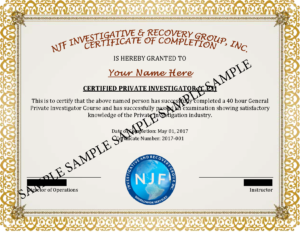Your success as a private investigator hinges on your reputation. That’s why we designed our Private Investigation training curriculum to provide you with a foundation of professional skills and ethical standards that will help you stand out in the field. Graduate with an understanding of the investigative process for a range of different cases including domestic disputes and child custody, insurance claims, arson, medical malpractice, missing persons, and more. With strong technical, hands-on, and interpersonal skills, you’ll have exactly what you need to achieve success as a private investigator.
Program Description
Students will learn the basic skills needed to enter private investigation field. Topics include professionalism; the investigative process; interviewing and interrogating skills; investigative tools and techniques; case management; the different types of investigations.
Program Objectives
After completing the Private Investigation program, students will be able to:
-
Outline the roles and responsibilities of private investigators and the professional skills, personal qualities, and ethical principles private investigators should possess.
-
Recognize and describe the components of the investigative process and explain the basic steps taken to process crime scenes.
-
Describe the lawful use of common investigative tools and techniques, such as interrogation, surveillance, fingerprinting, media, and evidence collection as well as the special considerations involving the use of force and firearms.
-
Recognize and describe the investigative process for different types of investigations, such as domestic disputes and child custody, insurance claims, arson, medical malpractice, missing persons, retail security, loss prevention, and executive protection scenarios.
Curriculum
| Lesson | Title | Lesson | Title |
| Lesson 1 | World of the Private Investigator | Lesson 18 | Arson Investigation |
| Lesson 2 | Investigative Records and Resources | Lesson 19 | Workers Compensation Investigation |
| Lesson 3 | Interviewing, Interrogation, and Statements | Lesson 20 | Writing Reports and Testifying in Court |
| Lesson 4 | Private Process Servers | Lesson 21 | Missing Persons Investigation |
| Lesson 5 | Marital Investigations | Lesson 22 | Parental Kidnapping Investigation |
| Lesson 6 | Employee Theft Investigation | Lesson 23 | Skip Tracing |
| Lesson 7 | Undercover Operations | Lesson 24 | Bounty Hunting |
| Lesson 8 | Surveillance and Surveillance Photography | Lesson 25 | Auto Repossession |
| Lesson 9 | Automobile Surveillance | Lesson 26 | Asset Investigation |
| Lesson 10 | Foot Surveillance | Lesson 27 | Business Intelligence Investigations |
| Lesson 11 | Shoplifting Detection and Shopping Investigations | Lesson 28 | Industrial Espionage Investigation and Counter Measures |
| Lesson 12 | Vehicle and Foot Pursuit | Lesson 29 | Electronic Surveillance and Counter Measures |
| Lesson 13 | Arrest Procedures and Tactics | Lesson 30 | Computer Crime Investigation |
| Lesson 14 | Personal and Private Background Investigations | Lesson 31 | Bodyguard Training |
| Lesson 15 | Employment Related Background Investigations | Lesson 32 | Executive Protection Training |
| Lesson 16 | Legal Investigations | Lesson 33 | Investigating by Computer |
| Lesson 17 | Insurance Fraud Investigation | Lesson 34 | Getting a Job as a Private Investigator |
| Lesson 35 | Starting and Operating Your Own Agency |
This is a 5 day / 40 hour course!
Registration Form Download


